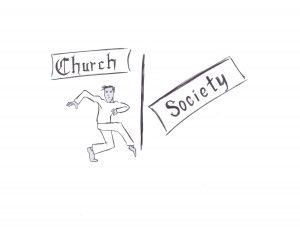A Missouri pastor named Phil Snider recently made waves when he delivered a speech at the Springfield City Council that began as an attack on gay marriage but underwent an unexpected 180 degree turn as he concluded by advocating for marriage equality.
I would encourage you to watch the video yourself, to experience the full impact of the surprise plot twist, but in short, he likens the church’s anti-gay rhetoric to the language used to oppress African Americans in previous decades, language that was also used by the church to promote segregation and stifle moves toward racial equality.
It was shocking to many within the religious community. And yet, for some, it was a heartening recognition of their own wishes for the church’s future.
Snider represents an ideological shift that has been seen emerging among the religious right in increasingly greater numbers, though still a small minority among the Christian community at large.
Whether you view this gradual inching toward more progressive ideals regarding the American value system as a positive or negative shift, the fact remains that it is ultimately inevitable.
As societal norms and cultural values change with the times, the surrounding institutions, including the church, are forced to adapt in some way. Either they vehemently reject the changes, or they embrace them and alter their doctrine accordingly.
Thus far, the majority of church leaders and members have opted for the former; but, as Snider recently demonstrated, it is slowly becoming less shocking for those who identify with the religious right to vocally support gay rights.
Among the churchgoers of our generation, it is fairly unsurprising to hear responses ranging from a more passive acceptance of (“Sure, it’s a sin, but we love them anyway”) to passionate advocacy for gay rights.
Our generation, and the ideals we extol, will shape the future of this country; this is true politically, in terms of legislation, and societally, in terms of what is deemed normal and what is deemed taboo. It stands to reason, then, that what we considered to be conservative values will undergo a change.
Many express fears that the Judeo-Christian ideology forming the bedrock of the American value system will be vanquished by radical progressives with their liberal agenda.
I would argue that this expectation is more than a bit unrealistic, considering the overwhelming religiosity and conservativism that still pervades American culture. According to a Gallup poll, 78 percent of American adults identify with some form of Christianity. It seems improbable that the beliefs held by the vast majority of citizens, as well as the beliefs that must be extolled by any politician with hopes of election, are destined for extinction.
What is realistic to assume is that the face of this belief system will change with the times.
As Snider pointed out, Christian churches have in the past advocated racial injustice and segregation, even stating that integration was against God’s word. Since those unfortunate periods in history, apologies have been issued and amendments have been made. The shifting of commonly-held ideas about race could not be ignored, and ultimately change was inevitable.
Whatever your individually-held beliefs about the morality of gay marriage, it is becoming increasingly apparent that the values espoused by “the church” at large will ultimately move with the shifting norms.
The church is, of course, here to stay; the question is, how will it adapt in order to remain relevant to the coming generations?


